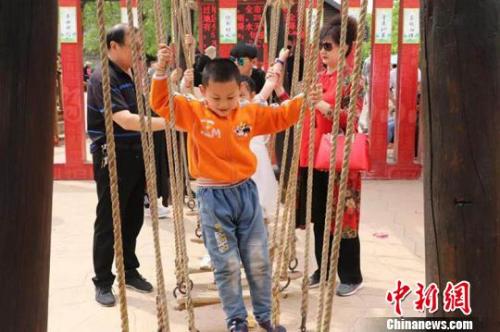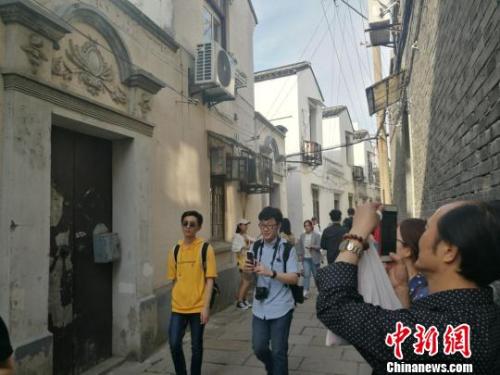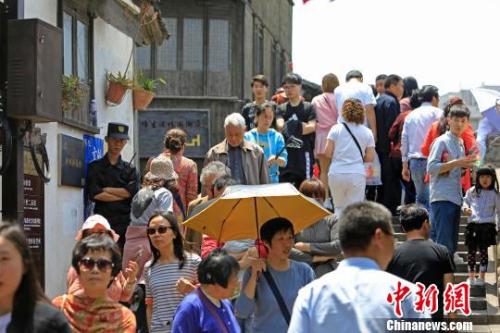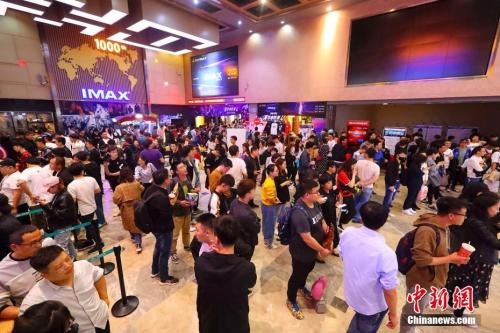
There are few shortcuts to success, but standing on the shoulders of "giants" can indeed make your starting point higher than others, which is an indisputable fact. In the domestic mid-sized SUV market, Highlander is definitely a name that cannot be ignored. Whether it is sales, reputation, or influence, it can fully afford the evaluation of "industry benchmark". Under the influence of the two-car strategy, it also launched its own corresponding model, which is Lvfang. With Highlander’s strong product appeal, there is no need to worry about the future market prospects of Lvfang. On this basis, it also waved a big hand and reactivated the name "Crown". Lvfang, which has the added feelings of the crown brand, is very attractive to car fans and even ordinary consumers. In this way, regardless of product reputation or brand influence, Crown Lu Fang is equivalent to standing on the shoulders of "giants", and the starting point is not too high.
Appearance: handsome and lazy style

Although the teachers come from the same family and use the same design language, due to the differences in details, there are still some differences between the Crown Lu Fang and the Highlander in terms of visual effects. The front face of the Crown Lu Fang is more reference to the design style of the American version of the Highlander XSE model. In addition to the classic "Crown" logo, which is very recognizable, the front surrounding area of the air intake grille is also quite large. With the horizontal grille of the pure black color scheme, it not only effectively stretches the visual width, but also creates a strong sense of movement, and the overall aura is very strong.

The Crown Lu Fang was positioned as a medium-sized SUV with a wheelbase of 2850mm and a length of 5015mm. Without a doubt, it was definitely a "big guy". To be honest, it was not easy to design a car of such a large size without looking dull. The front face of the Crown Lu Fang still maintained a "lazy" feeling, but through the adjustment of the details, the final effect was very different. Although it still had the same lazy style as Highlander, it was obviously more handsome.
On the front face, the classic "Crown" logo gives it a lot of bonus points, and for many fans, this emotional bonus is really hard to refuse. The bulge on the side waist line and the rear wheel arch is round but does not lose power, and the visual effect is very stretched. The curved lines all over the car look very gentle, and the light and shadow effects are not too sharp, which can alleviate the "bulky feeling" to a certain extent. In fact, for a model of this size, the appearance design is not stupid, and it is already half successful.
Interior: All designs are based on practicality
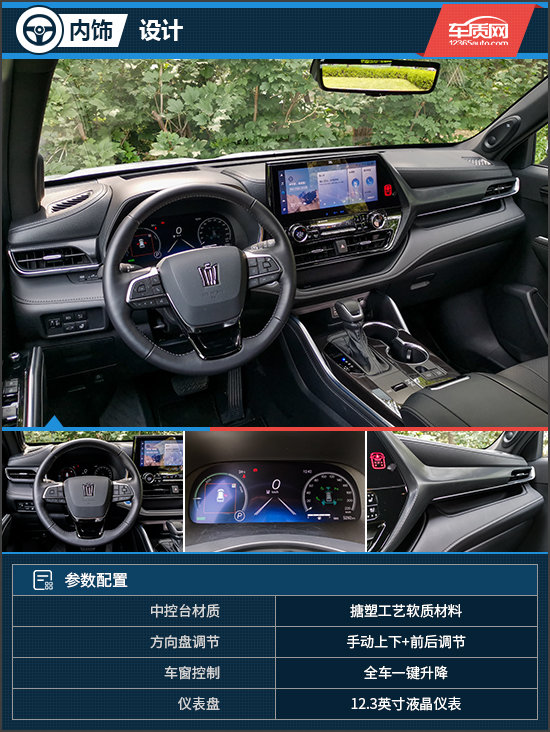
In terms of the interior, it is a slight exaggeration to say that almost all the design is serving the three words "practicality", which gives people a feeling of purity and is very suitable for home use. Although in terms of configuration, this top version of the Crown Land Display has performed quite well, with 12.3-inch full LCD meters, HUD head-up digital display, multi-function steering wheel, floating central control screen, etc., but even so, the technology atmosphere in the car is still not strong. For the interior design of the Crown Land Display, I really can’t give any comments related to the "sense of technology". Relatively speaking, the large-sized physical buttons and knobs on the center console are its signature features. After all, here, simplicity and ease of use are king.

The car is equipped with a 12.3-inch floating central control screen, the display effect is not bad, and the operation fluency is completely satisfactory. The interface UI design is simple and stylish, very pragmatic, the information reading is clear and easy to understand, and there are function-rich virtual buttons on the left and bottom of the screen, which makes the interaction feel very good. Based on the vehicle to everything function, the mainstream configuration is basically supported nowadays, such as satellite navigation, navigation road condition information display, road rescue calls, voice control, facial recognition and OTA upgrades, etc. The practical performance is remarkable.

The front dual-temperature zone automatic air conditioner control module is located below the central control screen. The large-size physical buttons and knobs are simple and easy to use, and the feel is also great. There is an independent display screen in the middle. Although the size is not large, it can display rich content information, which is very intuitive. Due to the large number of control buttons, it requires a certain learning cost when using it for the first time, but after familiarization, it can be easier to get started. In addition, the top version of the test drive is also equipped with a rear independent air conditioner. The control module adopts a combination of monochrome display + physical buttons, which is equally simple and easy to use.
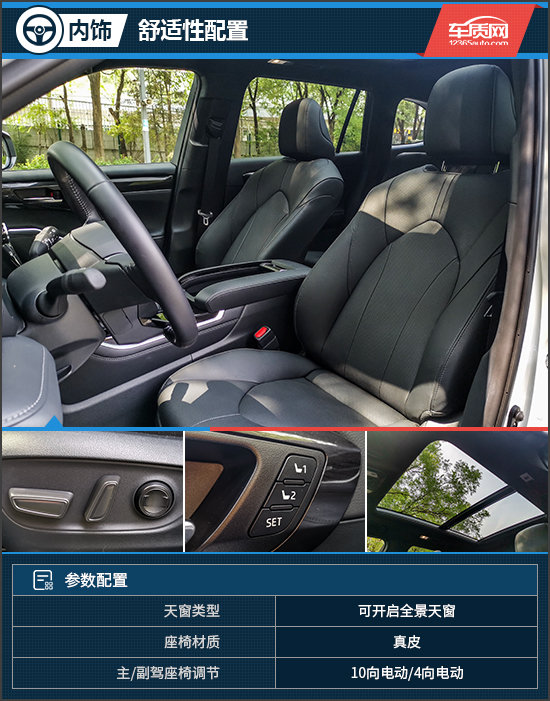
In terms of comfort, I think the performance of the Crown Land Release should be satisfactory to most consumers. After all, the good reputation accumulated by Highlander for many years can be copied here. In the configuration part, leather seats, seat electric adjustment, main driver seat memory, front seat heating/ventilation, panoramic sunroof can be opened, rear seat heating, etc., regardless of ergonomic design, space performance or configuration level, the Crown Land Release has almost reached the same level of "ceiling", which cannot be said to be perfect, but the gap is indeed not big.
Motivation: what it should look like in anticipation
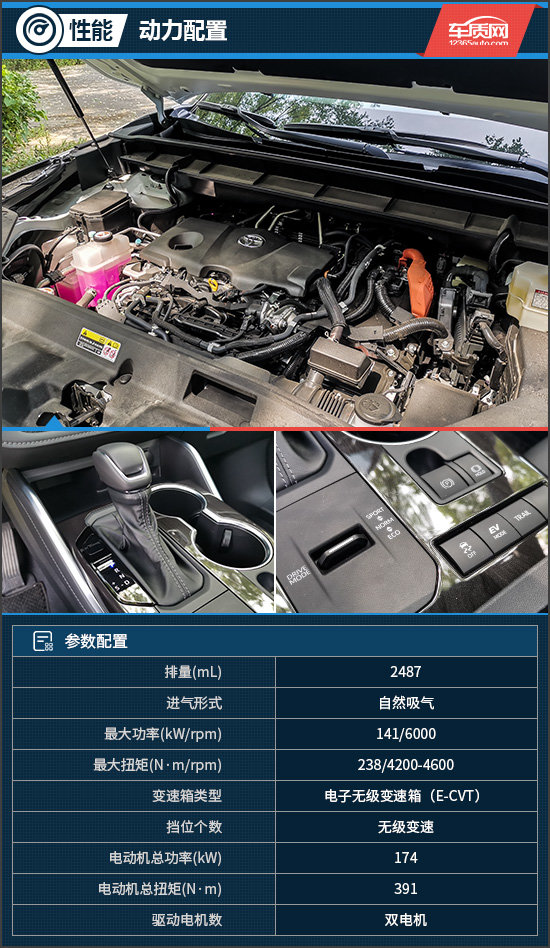
In terms of power, the Crown Land Ramp is equipped with a hybrid system based on a 2.5L engine and dual motors, and the hardware configuration is consistent with the new Highlander. Among them, the 2.5L gasoline engine has a maximum power of 141kW, a peak torque of 238N · m, the maximum power of the front motor is 134kW, the maximum power of the rear motor is 40kW, the comprehensive power of the system is 183kW, and the transmission system is matched with the E-CVT gearbox. It may not be intuitive to look at the parameters alone, but the excellent performance of this hybrid system in terms of smoothness and fuel economy need not be repeated, and those consumers who are willing to choose hybrid models believe that they will pay more attention to the performance of these aspects. As for the power level, it is reasonable.

In the initial acceleration stage, due to the existence of dual motors, the vehicle can still provide the driver with a fleeting "light feeling", and it will not make people feel that the power output is very meaty at the start, especially delayed. The response of the power system to the accelerator pedal is very delicate and accurate, and the acceleration experience is also different under different accelerator openings, which is very interesting. In daily driving, the accelerator opening is maintained within 1/3, and the power output is smooth and comfortable, but as long as it exceeds this range, even if it is only a little deep step on the accelerator, accompanied by the slightly noisy roar of the engine, although it sounds quite lively, the actual acceleration force is not strong, which will show a hint of "dry roar" embarrassment.
The "paragraph feeling" of the accelerator pedal is obvious. Maybe it doesn’t seem like a good adjective, but after actual experience, you can understand that it is definitely a positive word here. The adjustment of this hybrid system is quite clever, and it can give the most suitable power response according to the opening of the accelerator pedal, and it can basically meet the driver’s expectations. In terms of brakes, the initial foot feel is relatively fleshy, and I think it should be a compromise made to take care of comfort. After all, it is a car of such a large size, and the curb weight is more than 2 tons. If the brakes are very sensitive and the initial stage is very thief, it is really not a good thing. Of course, as the brake pedal continues to press deeply, the braking force release is relatively smooth and powerful, so there is no need to worry.
Overall, the start acceleration process of the Crown Land Release is smooth and comfortable, with sufficient power reserve. Although it may not be very fast, it can fully meet daily use. When the speed exceeds 80km/h, even if you continue to step on the accelerator deeply, it will still seem a little lack of stamina, and the power performance will tend to be flat. Of course, in sports mode, with the fast response of the engine and full output, the subjective driving experience is still quite enjoyable, but in terms of explosive power, it is still not as fast as the turbocharged engine. Therefore, a smooth and comfortable daily transportation is the correct way to open the Crown Land Release. Driving slowly is not only comfortable but also very fuel-efficient, which is also the biggest selling point of the Crown Land Release and this hybrid system.
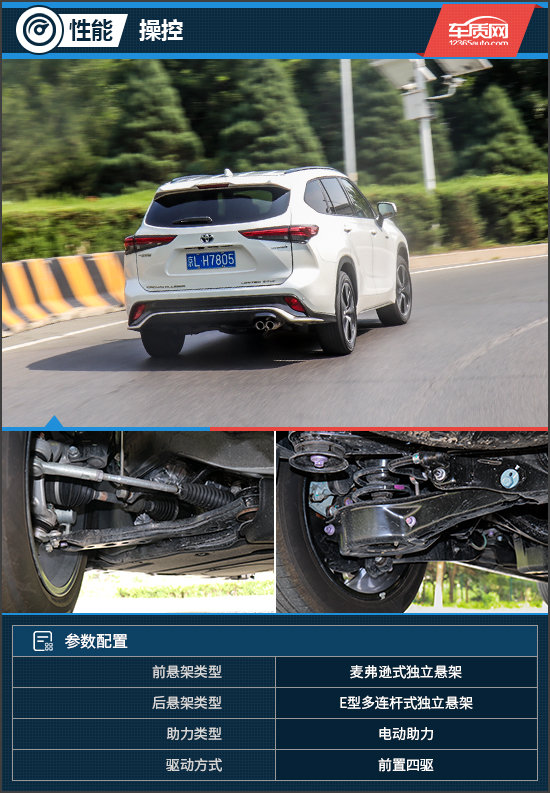
Crown Land Release is built on the TNGA architecture, and the chassis texture is quite excellent, very solid and compact, and there is no loose feeling at all. In terms of adjustment, although it is not blindly "soft", the feeling of flickering in the car is still quite obvious when continuously steering. Even if the suspension supports the body sufficiently, the overall setting of comfort is still unavoidable, and it will make many compromises for handling. Of course, this approach is definitely very reasonable. After all, compared with excellent handling, good comfort is obviously more in line with Crown Land Release’s product positioning. On urban road sections, the performance of vehicle quietness is still relatively good, but as the speed increases, the noise will indeed become louder and louder. Road dryness, wind noise, and engine noise are not small, which will slightly affect the mood.
The steering wheel is moderately sized, comfortable to hold, and the steering damping and correction force are also set very well. From the test drive experience, the virtual position in the middle of the steering wheel is not lar*****he pointing is more accurate, and the number of turns is not much. For an SUV of this size, it will not be very ****** to navigate in congested and complicated urban road conditions. Although the handling is not the selling point and advantage of the Crown Land Release, its performance is quite satisfactory in terms of basic handling experience and chassis texture, provided that it does not engage in intense driving.
Space: Still one of the biggest selling points
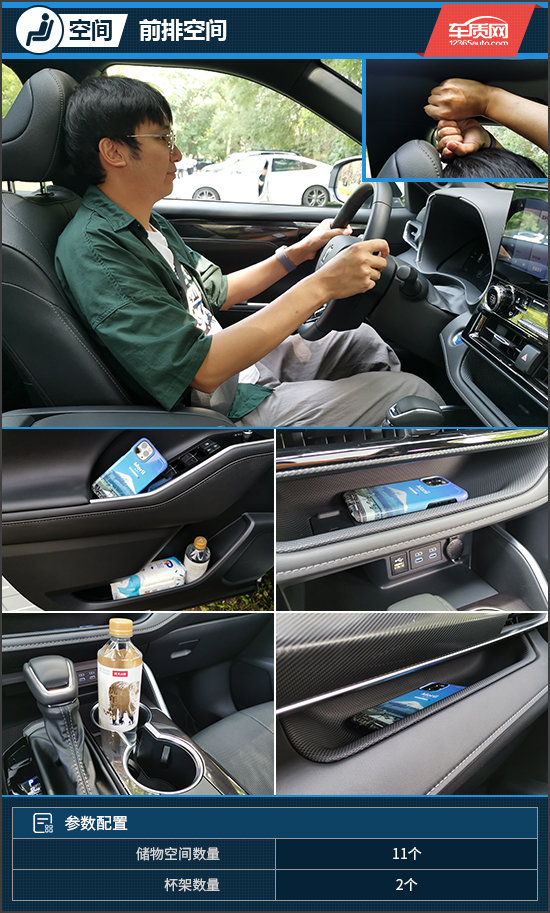
In terms of riding space, the 175cm-tall experiencer enters the front row. After adjusting the seat, there is a margin of about two punches on the head. With the transparent panoramic sunroof, the riding space is very spacious and feels very good. In the front storage part, the door panel storage slot has a large opening, excellent depth and space division. Coupled with the door handle with the back cover design, the storage capacity is quite excellent. As for the center console area, in addition to the traditional storage slot, the Crown Land Range, like the new Highlander, is designed with a through open storage slot, including the front side of the co-pilot, which is very convenient for placing mobile phones, wallets, keys, umbrellas and other items. The water cup holder is located on the right side of the stop rod. It adopts a through design and is equipped with a limiter, so it is more secure to place the water bottle. The front armrest box is opened by "sliding door", the internal space is quite regular, and the volume is also very considerable, which can store a lot of items.

Keeping the front seat position unchanged, the experiencer comes to the back row, the head is about one punch and four fingers away from the roof, and the legs are more than two punches. Of course, this is under the premise of not considering the space of the third row. In the regular 5-seat state, the second row of the crown land rest is quite spacious, and the middle floor is almost flat, coupled with a good lateral width, even if it takes three passengers, it will not seem cramped. In terms of storage, the regular door panel storage slot, seat bag and water cup holder are provided, which is not a problem for daily use.
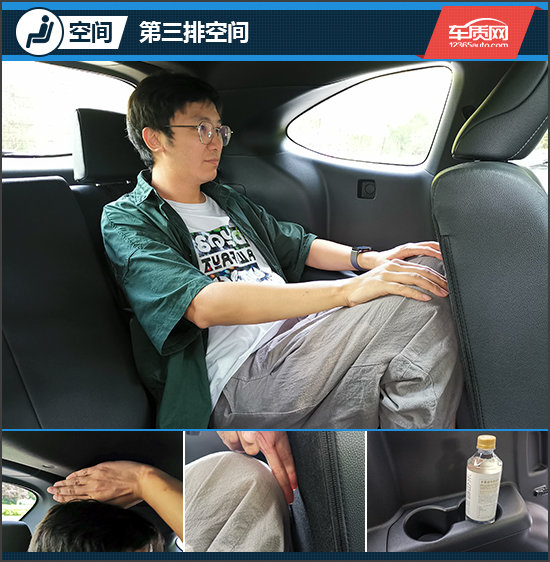
Sitting in the third row requires lifting up the second row of seats, which can be operated on both sides. Thanks to the good opening area, the process of getting on and off the bus will not seem too embarrassing. The backrest of the third row of seats supports angle adjustment. After sitting, the head space is excellent, and the margin of about four fingers is completely satisfactory. The legroom is only two fingers away when the second row of seats is at the back, which is very compact. Of course, if the second row of seats is moved forward and the space is evenly distributed, then the passengers in the second and third rows can get about a punch or so. In other words, the third row of seats in the crown land is not tasteless, at least on the basis of emergency use, the comfort of the third row passengers is still guaranteed. In fact, not only the ride space, but also configurations such as cup holders, storage slots, and air conditioners are provided, and the care is relatively comprehensive.

In the trunk part, the crown landing is very flexible. The second and third rows of seats support proportional reclining. After reclining, it can be connected with the trunk to form a flat floor storage space, which is very practical. Even when all three rows of seats are open, it is still not a problem to put a 20-inch boarding box and several backpacks in the trunk. As for the regular 5-seat state, the trunk space can fully meet the needs of daily household use, and the loading capacity is quite strong. To sum up, in terms of space and practicality, the performance of the crown landing will never disappoint you.
Security: industry mainstream configuration level
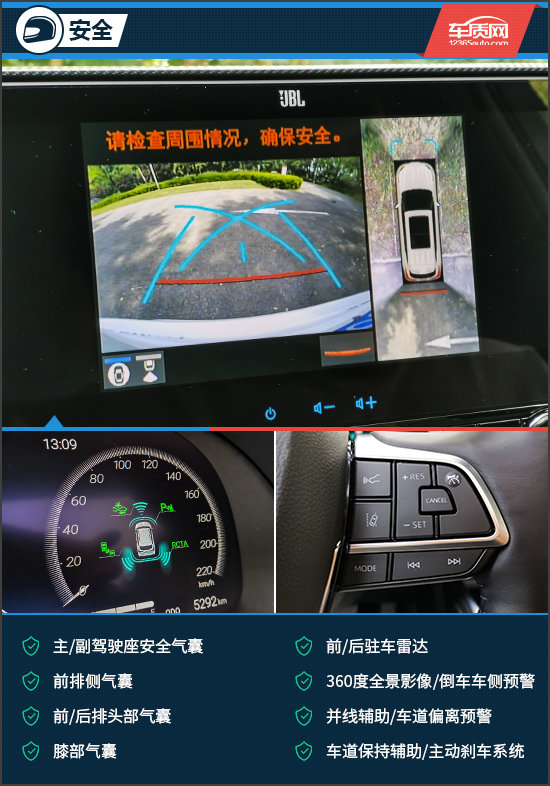
In the safety part, the configuration performance of the Crown Land Release has basically reached the mainstream level of the current industry, and the active/passive safety configuration is relatively rich. According to the actual measurement, the problems are mainly concentrated in the following two points. First, because the body is relatively wide, the lane centering and parallel assistance will seem a little too sensitive when used, especially in some road sections with narrow lane lines. Frequent prompts are really annoying. Then there is the old-fashioned reversing image problem. The picture clarity is quite touching, and it looks like it was shot with a non-smartphone more than ten years ago, which is very dated. Since the streaming rearview mirrors have been arranged, wouldn’t it be okay to upgrade the reversing image system? It’s really hard to understand.
Summarize:




























